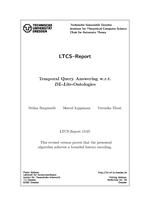LATPub726: Unterschied zwischen den Versionen
Aus International Center for Computational Logic
Marcel Lippmann (Diskussion | Beiträge) KKeine Bearbeitungszusammenfassung |
Marcel Lippmann (Diskussion | Beiträge) KKeine Bearbeitungszusammenfassung |
||
| Zeile 15: | Zeile 15: | ||
}} | }} | ||
{{Publikation Details | {{Publikation Details | ||
|Abstract=Ontology-based data access (OBDA) generalizes query answering in relational | |Abstract=Ontology-based data access (OBDA) generalizes query answering in relational databases. It allows to query a database by using the language of an ontology, abstracting from the actual relations of the database. For ontologies formulated in Description Logics of the DL-Lite family, OBDA can be realized by rewriting the query into a classical first-order query, e.g. an SQL query, by compiling the information of the ontology into the query. The query is then answered using classical database techniques. | ||
databases. It allows to query a database by using the language of an ontology, | In this report, we consider a temporal version of OBDA. We propose a temporal query language that combines a linear temporal logic with queries over DL-Lite-core-ontologies. This language is well-suited for expressing temporal properties of dynamical systems and is useful in context-aware applications that need to detect specific situations. | ||
abstracting from the actual relations of the database. For ontologies formulated | Using a first-order rewriting approach, we transform our temporal queries into queries over a temporal database. We then present three approaches to answering the resulting queries, all having different advantages and drawbacks. | ||
in Description Logics of the DL-Lite family, OBDA can be realized by rewriting | |||
the query into a classical first-order query, e.g. an SQL query, by compiling | |||
the information of the ontology into the query. The query is then answered using | |||
classical database techniques. | |||
In this report, we consider a temporal version of OBDA. We propose a temporal | |||
query language that combines a linear temporal logic with queries over | |||
DL-Lite-core-ontologies. | |||
properties of dynamical systems and is useful in context-aware applications that | |||
need to detect specific situations. | |||
Using a first-order rewriting approach, we transform our temporal queries into | |||
queries over a temporal database. We then present three approaches to answering | |||
the resulting queries, all having different advantages and drawbacks. | |||
|ISBN= | |ISBN= | ||
|ISSN= | |ISSN= | ||
| Zeile 51: | Zeile 36: | ||
year = {2013}, | year = {2013}, | ||
} | } | ||
}} | }} | ||
Version vom 23. März 2015, 13:24 Uhr
Temporal Query Answering w.r.t. DL-Lite-Ontologies
Stefan BorgwardtStefan Borgwardt, Marcel LippmannMarcel Lippmann, Veronika ThostVeronika Thost
Stefan Borgwardt, Marcel Lippmann, Veronika Thost
Temporal Query Answering w.r.t. DL-Lite-Ontologies
Technical Report, Chair of Automata Theory, TU Dresden, volume 13-05, 2013. LTCS-Report
Temporal Query Answering w.r.t. DL-Lite-Ontologies
Technical Report, Chair of Automata Theory, TU Dresden, volume 13-05, 2013. LTCS-Report
- KurzfassungAbstract
Ontology-based data access (OBDA) generalizes query answering in relational databases. It allows to query a database by using the language of an ontology, abstracting from the actual relations of the database. For ontologies formulated in Description Logics of the DL-Lite family, OBDA can be realized by rewriting the query into a classical first-order query, e.g. an SQL query, by compiling the information of the ontology into the query. The query is then answered using classical database techniques.In this report, we consider a temporal version of OBDA. We propose a temporal query language that combines a linear temporal logic with queries over DL-Lite-core-ontologies. This language is well-suited for expressing temporal properties of dynamical systems and is useful in context-aware applications that need to detect specific situations.
Using a first-order rewriting approach, we transform our temporal queries into queries over a temporal database. We then present three approaches to answering the resulting queries, all having different advantages and drawbacks. - Bemerkung: Note: Revised version. See http://lat.inf.tu-dresden.de/research/reports.html.
- Forschungsgruppe:Research Group: AutomatentheorieAutomata Theory
@techreport{ BoLT-LTCS-13-05,
address = {Dresden, Germany},
author = {Stefan {Borgwardt} and Marcel {Lippmann} and Veronika {Thost}},
institution = {Chair of Automata Theory, TU Dresden},
note = {Revised version. See http://lat.inf.tu-dresden.de/research/reports.html.},
number = {13-05},
title = {Temporal Query Answering w.r.t.\ \textit{DL-Lite}-Ontologies},
type = {LTCS-Report},
year = {2013},
}
